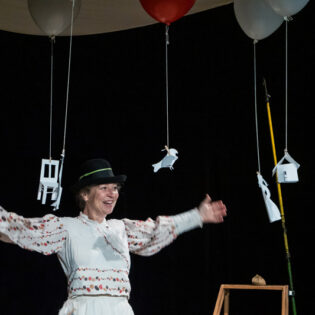Live and in person in the Courtyard of the Aga Khan Museum, 77 Wynford Dr. Toronto, Ont. Produced by Modern Times Stage Company and the Aga Khan Museum in association with Theatre Artaud.
Plays until June 26.
Written by Rouvan Silogix, Rafeh Mahmud and Ahad Lakhani
Based on Rumi’s Masnavi.
Directed by Rafeh Mahmud
Scenic design, lighting and props by Waleed Ansari
Costumes designed by Niloufar Ziaee
Sound design and score by John Gzowski
Cast: Michaela Lily Davies
Rouvan Silogix
Navtej Sandhu
From the production’s program: “In the Courtyard of the Aga Khan Museum, witness a re-imagining and radical adaptation of Rumi’s “Masnavi”: The Caged Bird Sings reveals a cage within a cage as this surreal piece unfolds for audiences in the round.
An original piece written by Rouvan Silogix, Rafeh Mahmud and Ahad Lakhani, The Caged Bird Sings holds three prisoners: two star-crossed lovers and scientists, Rumi and Jin, who share a cell with Sal, a mysterious vagrant. As they navigate their new-found reality and reconcile their past lives, they are haunted by ghosts and demons of their own making. The piece explores Sufi mysticism, ideas of Fanafillah, the prisons—literal and the metaphorical—that we are put in, that we put ourselves in and that we create ourselves, and how and whether it’s possible to escape such prisons.”
From the all-knowing-Google: “Jalāl al-Dīn Muḥammad Rūmī, or simply Rumi, was a 13th-century poet, Hanafi faqih, Islamic scholar, Maturidi theologian, and Sufi mystic originally from Greater Khorasan in Greater Iran. Rumi’s works were written mostly in Persian, but occasionally he also used Turkish, Arabic and Greek in his verse.”
“The Masnavi, is an extensive poem written in Persian by Jalal al-Din Muhammad Rumi, also known as Rumi. The Masnavi is one of the most influential works of Sufism, ascribed to be like a “Quran in Persian”. The Masnavi is a series of six books of poetry that together amount to around 25,000 verses or 50,000 lines. It is a spiritual text that teaches Sufis how to reach their goal of being truly in love with God.“
Waleed Ansari has designed a beautiful set of the cell/prison that looks like a kind of birdcage. There are ornate rugs on the floor with two simple cots for sleeping. One bed has pillows that look embroidered in vibrant colours. Sal (Rouvan Silogix) sleeps on that cot. Rumi (Mikaela Lily Davies) and Jin (Navtej Sandhu) alternate with the other cot.
The text of Rouvan Silogix, Rafeh Mahmud and Ahad Lakhani is divided into three parts: Fortune, Frenzy and Fanaa. Each part is then divided into sections, eight sections for the first part, six for the second part and seven sections for the third part. A section might deal with an ancient story, some esoteric musings etc.
The basic story is that two women, Rumi and Jin, are lovers and partners in a business that sells a love potion they created. One feels it would help humanity. The other wants to make money. They seem to have a difference of opinion of what is important. Sal says that he has been in that cell for a thousand years and is a former king who fell in love with one of his slaves, which is forbidden.
As Rumi, Mikaela Lily Davies gives a nuanced, impassioned performance. As Jin, Navtej Sandhu is emotional, driven and committed. Rouvan Silogix plays Sal with deliberately ‘over-the-top’ enthusiasm. One can imagine such enthusiasm because for the first time in a thousand years of captivity, Sal has company to ease his burden. These are three fascinating performances.
The writing is a combination of contemporary colloquialisms, poetic lyricism, vivid imagery and creative metaphors. The stories are arresting with the occasional one being impenetrable for its meaning.
Rafeh Mahmud has directed an elegant, beautifully imagined world of realism and mysticism. Mahmud has conjured a world of antiquity and one of now. It’s a wonderful exercise to discover the mysteries of the piece: what is the prison cell? Can they really escape? Why are they there? Are they prisoners of their own imagination? What an adventure to delve into poet Rumi’s world as realize by Rouvan Silogix, Rafeh Mahmud and Ahad Lakhani.
One of the notes for the production lamented the quality of translations/adaptations of Rumi, in that sometimes aspects were ‘erased’, hence the version the three co-writers created. It’s a pity that the program didn’t list any translations/adaptations the three co-writers found acceptable. Those of us who are curious would love to seek out these versions.
If you go, remember that the show is done outdoors in the courtyard of the beautiful Aha Khan Museum. Dress appropriately.
The Caged Bird Sings
Modern Times Stage Company and the Aga Khan Museum in association with Theatre Artaud, present, at 77 Wynford Dr. Toronto, Ont.
Playing until June 26, 2024.
Running time: 90 minutes (no intermission)
www.moderntimesstage.com
{ 0 comments }
